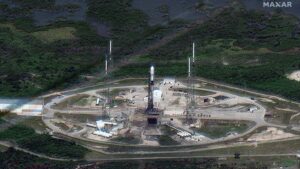SpaceX launches SiriusXM satellite
By Jeff Foust

WASHINGTON — SpaceX successfully placed into orbit a Maxar-built satellite for for SiriusXM Satellite Radio June 6, six months after the launch of a similar satellite that later malfunctioned in orbit.
The Falcon 9 lifted off at 12:26 a.m. Eastern from Space Launch Complex 40 at Cape Canaveral Space Force Station. The rocket’s first stage, which previously launched the Crew-1 and Crew-2 commercial crew missions for NASA, landed on a droneship in the Atlantic Ocean 8 minutes and 45 seconds after liftoff.
The rocket’s upper stage deployed its payload, the SXM-8 satellite, into a geostationary transfer orbit 32 minutes after liftoff.
SXM-8, which weighed nearly 7,000 kilograms at launch, is effectively identical to SXM-7, which launched in December 2020 on another Falcon 9. While that launch was successful, Maxar and SiriusXM disclosed in January that the spacecraft suffered “failures of certain SXM-7 payload units.” The companies didn’t disclosed details about the failures.
SiriusXM, in its quarterly financial results published April 28, took a $220 million charge to its net income because of what it now called the failure of the satellite. “The evaluation of SXM-7 concluded that the satellite will not function as intended, which we considered to be a triggering event,” the company stated in a filing with the U.S. Securities and Exchange Commission (SEC). “SXM-7 was determined to be a total loss.”
While the company took a $220 million, it noted that it has insurance on the satellite valued at $225 million. SiriusXM said it planned to file a claim on SXM-7 in the second quarter. “At this time, we are unable to reliably estimate the timing and amount of insurance recoveries,” it stated in the SEC filing.
Maxar, in a May 3 quarterly report filed with the SEC, took a change of $28 million associated with the loss of SXM-7. “After exhausting efforts to fully recover the satellite and further discussions with Sirius XM, in April 2021, we made the determination to record the cumulative adjustment to revenue,” the company stated. That charge included $25 million in final milestone payments for the satellite it will not receive and $3 million to cover costs associated with efforts to recover the satellite.
SiriusXM played down the effect of the loss of SXM-7, which, along with SXM-8, were intended to replace the XM-3 and XM-4 satellites that have been in orbit since the mid-2000s. SiriusXM said in its SEC filings than it believes that XM-3 and XM-4 can continue to operate for several more years, and it has in orbit XM-5, a spare satellite launched in 2010.
Sean Sullivan, chief financial officer of SiriusXM, said in an April 28 earnings call that the company has released a request for proposals for a replacement satellite. He did not disclose the schedule for acquiring or launching that replacement satellite.
June 6, 2021 at 11:10AM
via SpaceNews read more...

Post a Comment